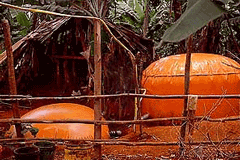Thu 10 Jun 2004
Alex Steffen writes on WorldChanging:
 Under the right conditions, organic waste, from compost to sewage, can be processed to decay into slurry and biogas — fertilizer and fuel. Superflex is building biogas systems for small villages in Cambodia, Tanzania and elsewhere:
Under the right conditions, organic waste, from compost to sewage, can be processed to decay into slurry and biogas — fertilizer and fuel. Superflex is building biogas systems for small villages in Cambodia, Tanzania and elsewhere:
“Superflex has collaborated with Danish and African engineers to construct a simple, portable biogas unit that can produce sufficient gas for the cooking and lighting needs of an African family. The system has been adapted to meet the efficiency and style demands of a modern African consumer. It is intended to match the needs and economic resources that we believe exist in small-scale economies. The orange biogas plant produces biogas from organic materials, such as human and animal stools. For a modest sum, an African family will be able to buy such a biogas system and achieve self-sufficiency in energy. The plant produces approx. 4 cubic metres of gas per day from the dung from 2-3 cattle. This is enough for a family of 8-10 members for cooking purposes and to run one gas lamp in the evening.”
I remember hearing that back-to-the-land types in the 70s found biogas systems unstable and dangerous. Superflex claims to have solved these problems through “the innovation of a pressure equalisation system and a provocative new construction method and design” but I lack the background to say either way. Still, distributed biogas sounds like a great idea.